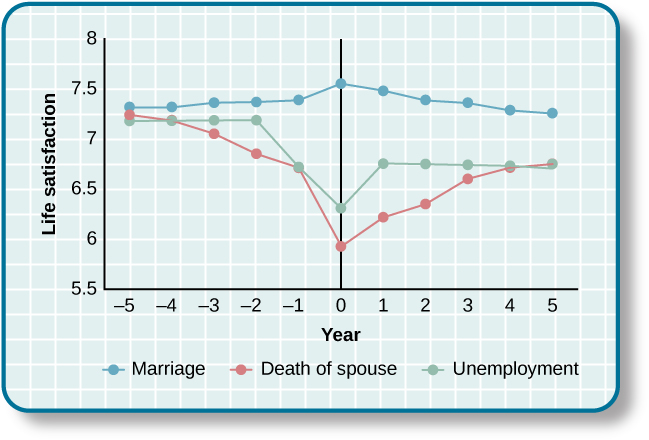| << Chapter < Page | Chapter >> Page > |

Recently, some have raised questions concerning the extent to which important life events can permanently alter people’s happiness set points (Diener, Lucas,&Scollon, 2006). Evidence from a number of investigations suggests that, in some circumstances, happiness levels do not revert to their original positions. For example, although people generally tend to adapt to marriage so that it no longer makes them happier or unhappier than before, they often do not fully adapt to unemployment or severe disabilities (Diener, 2012). [link] , which is based on longitudinal data from a sample of over 3,000 German respondents, shows life satisfaction scores several years before, during, and after various life events, and it illustrates how people adapt (or fail to adapt) to these events. German respondents did not get lasting emotional boosts from marriage; instead, they reported brief increases in happiness, followed by quick adaptation. In contrast, widows and those who had been laid off experienced sizeable decreases in happiness that appeared to result in long-term changes in life satisfaction (Diener et al., 2006). Further, longitudinal data from the same sample showed that happiness levels changed significantly over time for nearly a quarter of respondents, with 9% showing major changes (Fujita&Diener, 2005). Thus, long-term happiness levels can and do change for some people.

Some recent findings about happiness provide an optimistic picture, suggesting that real changes in happiness are possible. For example, thoughtfully developed well-being interventions designed to augment people’s baseline levels of happiness may increase happiness in ways that are permanent and long-lasting, not just temporary. These changes in happiness may be targeted at individual, organizational, and societal levels (Diener et al., 2006). Researchers in one study found that a series of happiness interventions involving such exercises as writing down three good things that occurred each day led to increases in happiness that lasted over six months (Seligman et al., 2005).
Measuring happiness and well-being at the societal level over time may assist policy makers in determining if people are generally happy or miserable, as well as when and why they might feel the way they do. Studies show that average national happiness scores (over time and across countries) relate strongly to six key variables: per capita gross domestic product (GDP, which reflects a nation’s economic standard of living), social support, freedom to make important life choices, healthy life expectancy, freedom from perceived corruption in government and business, and generosity (Helliwell et al., 2013). Investigating why people are happy or unhappy might help policymakers develop programs that increase happiness and well-being within a society (Diener et al., 2006). Resolutions about contemporary political and social issues that are frequent topics of debate—such as poverty, taxation, affordable health care and housing, clean air and water, and income inequality—might be best considered with people’s happiness in mind.

Notification Switch
Would you like to follow the 'Psychology' conversation and receive update notifications?